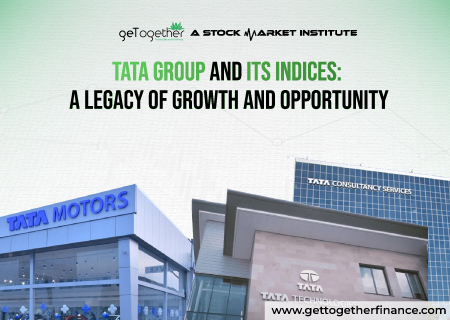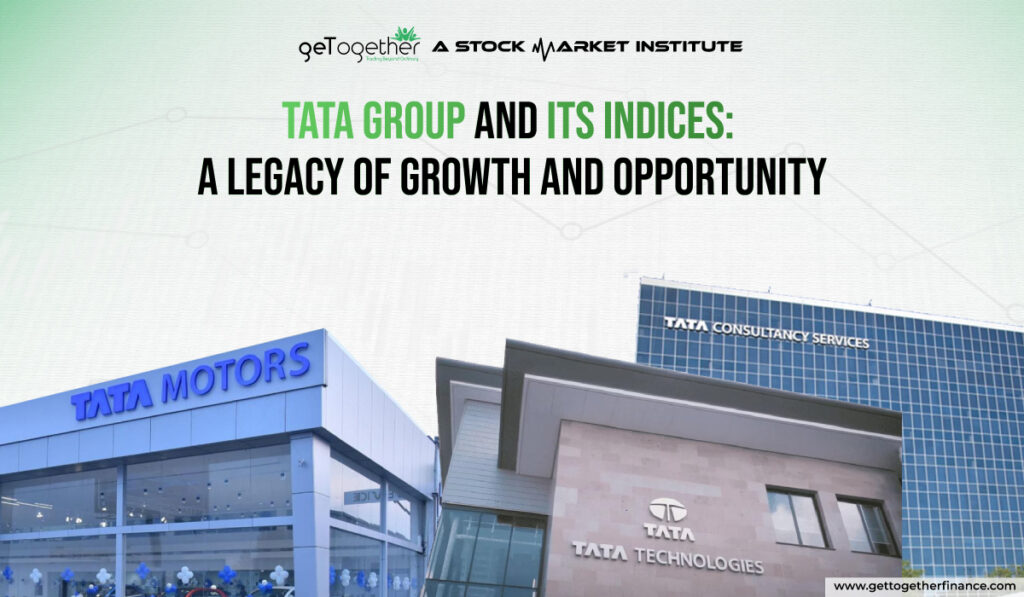Tata Group and Its Indices: A Legacy of Growth and Opportunity


Overview
In the Indian stock market, the Tata Group’s influence is profound. Many of its companies are listed on major stock exchanges, contributing to the overall market dynamics and investor sentiment. Over the years, Tata Group companies have shown consistent growth, attracting both domestic and international investors. Their robust performance and adherence to ethical business practices have cemented the group’s reputation as a reliable and stable investment choice.
On the other hand, its stock indices are designed to give a complete overview of the financial health and market performance of Tata Group companies. This blog will guide you on Tata Group and its major indices. Along with this, it will dive deeper into how these indices work, and what specific insights they can offer to savvy investors.
The Tata Group and Stock Market Indices

The Tata Group, a name synonymous with Indian industry, boasts a rich history and a dynamic presence in the stock market. It is a conglomerate enterprise, established in 1868. The company has woven its way into the fabric of Indian life, impacting sectors ranging from steel and automobiles to IT and consumer goods.
A Quick View At Tata Group History
The Tata Group’s journey began in the late 19th century by Jamsetji Tata. The company established the first cotton mill in Bombay (now Mumbai) and laid the foundation for diversified industrial firms. Over the decades, the group weathered economic and political storms, consistently adapting and expanding. Key milestones include:
- 1903: Tata Steel, Asia’s first integrated private steel company, is established.
- 1932: Tata Airlines, later known as Air India, takes flight, marking India’s entry into aviation.
- 1945: Tata Motors, a leading automotive manufacturer, is established.
- 1968: Tata Consultancy Services (TCS), a pioneer in the Indian IT industry, is founded.
Tata Group- A Pillar of the Indian Stock Market
The Tata Group’s influence extends far beyond its tangible products. It plays a crucial role in the Indian stock market, serving as a trendsetter for the country’s economic health. With over 19 publicly listed companies, the Tata Group accounts for a significant portion of market capitalization. Here’s how it impacts the market:
- Stock Performance: Strong financial results for companies like TCS and Tata Motors lead to rising stock prices, boosting investor confidence and impacting the overall market.
- Investor Magnet: The Tata Group’s reputation for innovation, ethical practices, and long-term vision attracts investors, contributing to market stability and growth.
- Sectoral Benchmark: Leading companies in their sectors, Tata companies set the bar for others, providing valuable insights for investors looking to understand specific industries.
Tata Group Umbrella – The List of Companies

Tata Group has spread its branches in every sector. Here’s a more comprehensive breakdown of Tata Group companies categorised by their industries:
| Category | Listed Companies | Unlisted Companies | Upcoming Subsidiaries (Listing Status – Unconfirmed) |
| Information Systems & Communication | Tata Consultancy Services (TCS)Tata Communications | Tata ElxsiTata DigitalTata Advanced Systems (TAS)Nelco | |
| Steel & Materials | Tata Steel (includes Tata Metaliks) | Tata PigmentsTata BlueScope Steel (Steel manufacturing) | |
| Automobiles & Automotive Components | Tata MotorsJaguar Land Rover | Tata Autocomp Systems | Tata Motors Passenger Vehicles (Electric Vehicle Manufacturer) |
| Consumer Goods & Retail | Indian Hotels Company (IHCL) Titan CompanyTrentVoltas Beko | Tata ChemicalsTata Consumer Products (includes Tata Coffee and Tata Tea)Infinity Retail (Croma)Tata SIA Airlines (Vistara) Air IndiaTata PlayTata Teleservices | |
| Energy & Utilities | Tata Power | Tata Power RenewablesTata Power Delhi Distribution Limited | |
| Engineering | Tata Consultancy Engineers | Tata Projects | |
| Infrastructure | Tata Realty and Infrastructure Limited (TRIL) | ||
| Financial Services | Tata Capital Financial Services Limited | Tata AIA Life Insurance Tata AIG General InsuranceTata Mutual Fund | |
| Others | Tata Investment CorporationTata InternationalTayo RollsThe Indian Hotels CompanyTaj Hotels Palaces Resorts Safaris |
Upcoming Tata Group Projects:

The Tata Group constantly strives for innovation and growth. Here are some exciting projects that are in the pipeline:
- Sustainability Focus: Investments in renewable energy sources like solar and wind power.
- Electric Vehicles: Development and manufacturing of electric vehicles across passenger car and commercial vehicle segments.
- Technological Advancements: Research and development in artificial intelligence, big data analytics, and digital transformation across various sectors.
- Global Expansion: Strategic partnerships and expansion plans to strengthen the group’s international footprint.
Range of Tata Group Index: The Key Indices
Several stock market indices offer a window into the performance of the Tata Group and its constituent companies. Here are two key indices:
- Nifty Tata Group Index: This benchmark index, launched by the National Stock Exchange of India (NSE), tracks the performance of the top 12 Tata companies based on their free-float market capitalization.
- Nifty 50: While not specifically focused on the Tata Group, this flagship index of the NSE includes several Tata companies like TCS, Tata Motors, and ITC.
Methodology of Index Calculation
The Tata Group Indices are typically calculated using a market-capitalization-weighted methodology. Here’s a step-by-step guide on the process:
- Selection of Companies: All publicly listed companies under the Tata Group umbrella are selected based on their market capitalization, liquidity, and financial performance.
- Weightage Assignment: Each company’s weight in the index is determined by its market capitalization. Larger companies like TCS and Tata Motors have a higher weightage, significantly influencing the index’s performance.
- Index Calculation: The index value is calculated by summing the market capitalizations of the constituent companies, adjusted for any corporate actions like stock splits or dividends. This sum is then divided by a predetermined divisor to maintain consistency over time.
Also Read: Adani Group
Significance of Tata Group Indices

The Tata Group Indices serve several crucial purposes for investors, analysts, and market participants:
- Performance Benchmarking: These indices provide a benchmark for comparing the performance of individual Tata Group companies against the collective performance of the group. Investors can gauge how well a particular company is performing relative to its peers within the conglomerate.
- Market Sentiment Indicator: The indices reflect investor sentiment towards the Tata Group as a whole. A rising index indicates positive market sentiment and investor confidence, while a declining index suggests caution or negative sentiment.
- Investment Decision-Making: For investors looking to invest in Tata Group companies, the indices offer a consolidated view of the group’s overall market performance. This aids in making informed investment decisions, particularly for those interested in sector-specific investments within the Tata portfolio.
- Economic Indicator: Given the Tata Group’s significant influence on the Indian economy, the indices also serve as an economic indicator, reflecting broader economic trends and market conditions.
Current Projects and Real-Life Examples

To provide a comprehensive view, let’s explore some current projects and real-life examples:
- Tata Motors and Electric Vehicles (EVs): Tata Motors is heavily investing in the EV segment, aiming to become a leader in sustainable mobility. The launch of models like the Tata Nexon EV and plans to expand the EV portfolio significantly impact the indices.
- Tata Steel and Sustainability Initiatives: Tata Steel’s focus on sustainability, including reducing carbon emissions and adopting green technologies, not only enhances its market reputation but also positively influences the indices.
- TCS and Digital Transformation: TCS’s initiatives in digital transformation and IT services for global clients continue to drive its growth, making it a crucial contributor to the indices’ performance.
- Tata Power and Renewable Energy: Tata Power’s investments in renewable energy projects, such as solar and wind farms, align with global sustainability trends and boost the energy sector’s representation in the indices.
Conclusion
The Tata Group’s story is one of innovation, resilience, and a deep connection to the Indian economy. As a major player in the stock market, the Tata Group presents a compelling case for investors who are seeking great exposure to a diverse and dynamic conglomerate. By understanding the nuances of the Tata Group indices, investors can gain valuable insights into the conglomerate’s performance within the broader Indian stock market landscape. Remember, these indices are just tools for analysis, and conducting in-depth research on individual companies and overall market trends remains crucial for making informed investment decisions.
FAQs
What is the NIFTY Tata Group Index?
This benchmark index by the NSE tracks the top 12 Tata companies based on their free-float market capitalization. It reflects the overall performance of the Tata Group.
What are some benefits of the NIFTY Tata Group Index for investors?
It allows gauging the Tata Group’s health, informs investment strategies through ETFs, and enables comparison with the broader market (NIFTY 50).
What are some limitations of the Tata Group indices?
The NIFTY Tata Group only tracks a select few companies, and both indices are susceptible to overall market fluctuations.
What are some upcoming projects for the Tata Group?
The group focuses on sustainability (renewable energy), electric vehicles, technological advancements (AI), and global expansion, impacting various sectors.
Does the Tata Group contribute to social causes?
Yes, the Tata Group actively invests in social welfare initiatives like education, healthcare, and rural development, demonstrating social responsibility.



 Facebook
Facebook  Instagram
Instagram  Youtube
Youtube 
